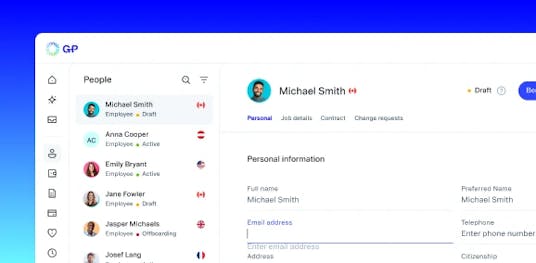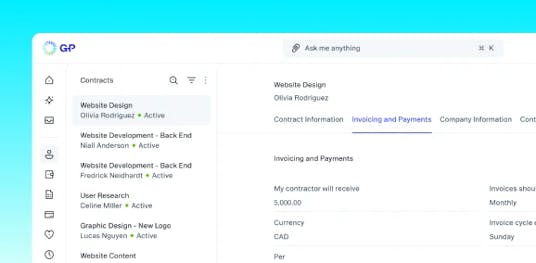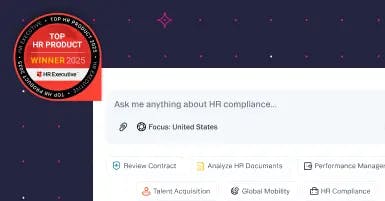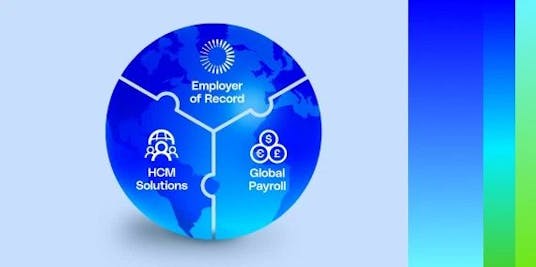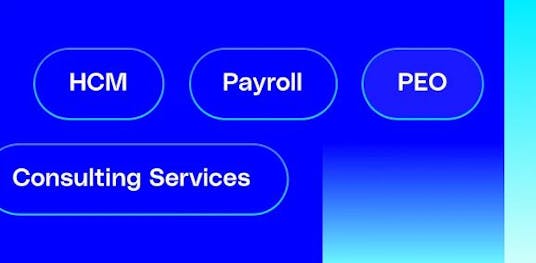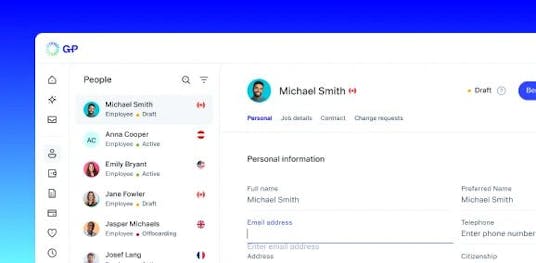Finland is one of the least corrupt countries in the world, according to the Corruption Perceptions Index (CPI). This index measures public sector corruption as judged by experts and business executives. It covers bribery, misuse of public money, abuse of public office for personal gain, nepotism in the civil service, and state capture.
The country has a vibrant entrepreneurial landscape and an excellent tech infrastructure, including advanced 5G networks. Finland’s population is one of the most digitally skilled in Europe. The workforce is strong in technical fields like information and communication technology (ICT), engineering, and health technology.
Before expanding into Finland, you’ll need to understand contracts, taxes, wages, benefits, and other employment laws. Our guide will tell you everything you need to know about hiring in Finland.
What to know before hiring in Finland

If you’re expanding your business into Finland for the first time, there are important legal requirements to be aware of. These norms and laws influence hiring practices in Finland and many aspects of the employer-employee relationship, including compensation and benefits.
G-P Gia™, our AI-powered global HR agent, can answer your toughest compliance questions across 50 countries — including Finland — and all 50 U.S. states. Reduce your reliance on outside counsel and cut the time and cost of compliance by up to 95% with Gia.
Here are five things to know about hiring in Finland.
1. Collective Bargaining Agreements (CBAs)
Finland has 160+ universally binding Collective Bargaining Agreements (CBAs). A universally binding CBA applies to all employers, whether they’re members of an employers’ association or not. This makes a level playing field and sets minimum standards for employment terms.
Wages, working hours, overtime, holiday entitlements, sick pay, and notice periods are covered by CBAs in Finland. They can address issues like training, occupational safety, and procedures for resolving disputes too. If you’re expanding to Finland, check the applicable CBA for your sector.
2. Working hours and pay
The statutory working time is eight hours per day and 40 hours per week. Many CBAs set shorter weekly hours, typically 7.5 hours a day and 37.5 hours a week. Working hours can be averaged over a period of up to 52 weeks. This enables flexible scheduling.
Overtime is allowed with employee consent. Overtime pay is at least 50% extra for the first two hours and 100% extra for any hours after that.
Finland doesn’t have a national minimum wage. Sector-specific CBAs set minimum pay. Pay is monthly. Employees get holiday pay, sick pay, and other benefits as set by law or the applicable CBA.
3. Taxes and social benefits
Employees pay progressive national and municipal income taxes. The national tax rate increases with income. Municipal tax rates are between 16–23%. Evangelical Lutheran and Orthodox church members pay a church tax too.
Both employers and employees contribute to social benefits. Employees pay pension, unemployment, and health insurance contributions, which are withheld from their salary. Employers pay extra social security contributions, usually 20–25% of gross salary.
Taxes and social security contributions fund Finland’s universal healthcare.
4. Paid time off
Employees get at least 2.5 days of paid vacation for every month they work. If an employee works the full holiday year (April 1 to March 31) they'll get a total of 30 days of annual leave. Saturdays count as leave days, so five weeks of leave equals 24–25 working days. Employees who have worked less than a year get at least two days of paid leave for every month of service.
Finland has 12 national holidays. Employees usually get paid leave on these days. Employees in Finland also get paid sick leave. Employers pay full salary for the first nine days. The Social Insurance Institution provides sickness allowance after that.
Finland has paid maternity (known as pregnancy leave) and parental leave, as well as leave for child care and family emergencies:
-
Pregnancy leave: 40 working days that typically starts 30 days before the expected due date.
-
Parental leave: After pregnancy leave, each parent (regardless of gender) is entitled to 160 working days of parental leave. This leave can be divided into four periods but must be used before the child turns two. Parents can transfer up to 63 days to the other parent, and single parents are entitled to the full 320 days.
5. Local languages
Finland has two official languages: Finnish and Swedish. Finnish is the more broadly spoken of the two. Most people who speak Swedish as their first language live in the Åland Islands, an autonomous part of Finland in the Baltic Sea.
Other common languages in Finland are English and German. English is especially common in business settings.
Top hiring hubs in Finland
Some cities in Finland are known for particular industries. Knowing what each city has to offer allows you to focus your hiring efforts in the right place and fill roles faster.
The top talent hubs in Finland are:
-
Helsinki is the capital. Helsinki has the largest population and the highest concentration of businesses in the country. The city has produced several startups with a value of over USD 1B. Companies include game developer Supercell and food delivery platform Wolt.
-
Espoo is part of the greater Helsinki area. It’s a major tech hub home to Nokia's headquarters and Aalto University's innovation ecosystem.
-
Tampere is located in southern Finland. Tampere is the third-largest city and a big economic center. Tampere is known for its engineering, manufacturing, and IT sectors.
-
Turku is an important port city. Shipbuilding, biotechnology, pharmaceuticals, food industry, and logistics are strong in Turku.
-
Oulu is located in northern Finland. It’s known for 5G technology, software development, and other high-tech industries. It offers a lower cost of living compared to southern hubs.
-
Vantaa is part of the Greater Helsinki area. Vantaa is home to Helsinki airport and several logistics, technology, and service companies.
Key industries in Finland
Understanding Finland’s main industries allows you to benchmark salaries and benefits. You can use this insight to make smart choices about where to invest and grow your workforce.
The main industries in Finland include:
-
Forestry and paper: Global pulp and paper companies like Stora Enso and UPM-Kymmene are headquartered in Finland. The country produces timber, plywood, and various wood-based building materials and furniture. Specialist talent includes bioeconomy and biorefinery experts, forest resource management and sustainability professionals, and process automation mill workers.
-
Maritime and shipbuilding: Finland is known for building specialized vessels, including luxury cruise ships and icebreakers. Wärtsilä is a global leader in marine and energy solutions. Specialist talent includes Arctic marine technology experts, naval architects and marine engineers, and sustainable shipping and decarbonization experts.
-
Technology and ICT: Finland is known for its ICT sector. Software development, telecommunications, and electronics are the main areas. Companies like Nokia are based in the country. Specialist talent includes cybersecurity specialists, software and cloud development, 5G and telecommunications engineers.
-
Energy: Finland is a leader in clean energy. A big portion of its electricity comes from nuclear power. The country is aiming for carbon neutrality by 2035. Specialist talent includes energy efficiency and smart grids experts, renewable energy engineers, and combustion and emissions control specialists.
-
Chemicals: Finland has a big chemical sector. It produces chemicals, plastics, and pharmaceuticals. Specialist talent includes bio-based chemicals and materials scientists, process engineers, analytical chemists, and quality control professionals.
The cost of hiring an employee in Finland

Whether you’re hiring one employee or an entire team in Finland, expenses are inevitable. Budget for the following:
-
Setting up an entity (unless you partner with an employer of record)
-
Advertising job positions
-
Paying referral bonuses to employees with connections in Finland
-
Paying an in-house hiring committee
-
Traveling to and from Finland, including hotel stays, meals, and transportation
-
Partnering with a translator to draft documents or facilitate conversations (if applicable)
-
Using a background check service for screening candidates
-
Drafting compliant employment contracts, legal review, and consultation with HR and legal experts
-
Costs for providing computers, phones, and software licenses
-
Onboarding materials and initial training
-
Costs for maintaining tax and payroll records and documentation
According to G-P Verified sources from Gia, the employer burden rate in Finland, which includes costs triggered on top of salaries, ranges from 20–25%, excluding accident insurance, which can vary.
What does a company need to do to hire employees in Finland?
Make sure you cover these essentials before expanding your team in Finland:
-
Register your company with the Finnish Trade Register.
-
Get a business ID.
-
Register with the Finnish Tax Administration.
-
Register as an employer.
-
Subscribe to the incomes register.
-
Open a local bank account and deposit the minimum capital requirement.
-
Get employee personal identity codes for tax, social security, and payroll purposes.
-
Buy policies from insurance companies authorized by Finnish law.
-
Notify the Finnish Immigration Service (for international employees).
-
Keep comprehensive employment and payroll records.
Setting up a subsidiary in Finland can take weeks or months. Use G-P EOR to hire full-time employees in Finland without setting up your own entity. Build your team at a lower cost and with peace of mind that you’re doing so compliantly.
The steps to hiring in Finland

The hiring process in Finland is similar to the one you’re likely familiar with in your own country. The hiring process follows five basic steps: advertising the job, evaluating applications, interviewing candidates, sending job offers, and onboarding new employees.
1. Advertise job vacancies
Clearly outline the job description, responsibilities, and qualifications. Make sure the advertisement is nondiscriminatory and complies with Finnish equality and antidiscrimination laws. All criteria in the job ad must be objectively justified and relevant to the position.
As of 2025, employers must publish job postings on the official Job Market Finland e-service platform. The platform provides structured templates and guidance to help ensure compliance with transparency and nondiscrimination laws.
Duunitori, Jobly, Oikotie Työpaikat, Indeed, and Job Market Finland are other popular job sites in Finland.
2. Evaluate applications
Gather CVs and application forms. Make a shortlist of candidates based on objective criteria relevant to the job description. Obtain explicit consent for any psychological or health-related assessments.
While there’s no statutory retention period for recruitment records, we recommend keeping them for at least one year after the process concludes.
3. Interview candidates
Interview candidates who made it onto your shortlist. Use structured, nondiscriminatory interview questions. Gia can help you create questions that follow antidiscrimination laws in Finland so you can find the best fit for the role while complying with local regulations.
4. Make job offers
Contact your chosen candidate to offer them a position with your company. Prepare a written employment contract that complies with the Finnish Employment Contracts Act. Both parties have to sign the contract before employment begins.
5. Onboard new employees
Now you can onboard new employees. Register the new employee with the Finnish Tax Administration and relevant social security authorities. Provide necessary onboarding documents, workplace orientation, and health and safety training.
If you’re working with an EOR like G-P, you won’t have to worry about the administrative burden of onboarding. We’ll streamline the process, so you can focus on training your new hire and integrating them into your company culture.
Hiring contractors in Finland
Working with independent contractors in Finland can be a cost-effective way to test the market and build a presence without the commitment of full-time employees. Contractors based in Finland understand local consumer behavior, rules, and business practices. They’ll be ready to start working quickly with their own equipment and established work processes.
Hiring contractors allows you to easily adjust your workforce based on your business needs, without the complexities and costs of employment.
Before you enter an agreement with an independent contractor in Finland, consider the following:
1. Employees vs. independent contractors
It’s important to understand the difference between employees and independent contractors. In Finland, employers hire employees to do work and, in return, pay them a regular salary and benefits. Independent contractors provide services. Unlike employees, contractors set their schedules, use their own equipment, and work on specific projects, rather than having an ongoing role.
2. Penalties for misclassification
Classifying someone as a contractor when they’re not can lead to severe penalties. If misclassification occurs, you’ll have to:
-
Pay unpaid social security contributions, taxes, and employment benefits.
-
Pay administrative fines.
-
Face criminal sanctions in cases of intentional or gross negligence.
3. How to pay contractors in Finland
G-P Contractor™ takes away the messy, time-consuming process of hiring and paying international contractors. You can create and issue contracts and pay contractors with just a few clicks, all while ensuring a compliant process.
Hire employees and contractors in Finland with G-P
Our SaaS and AI-powered products – EOR, Contractor, and Gia – support companies as they build and manage global teams.
G-P is the recognized leader in global employment with more than a decade of experience; the largest team of HR, legal, and compliance experts; and a global proprietary knowledge base.
Make your expansion to Finland easier with G-P. Contact us or book a demo today.
